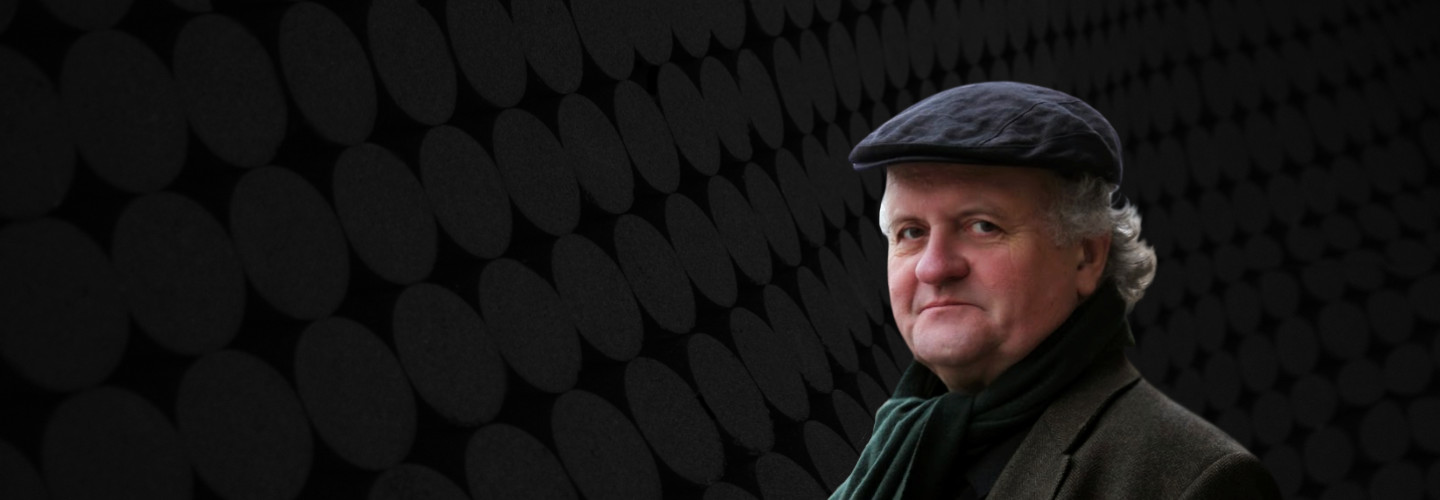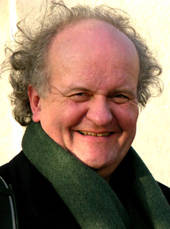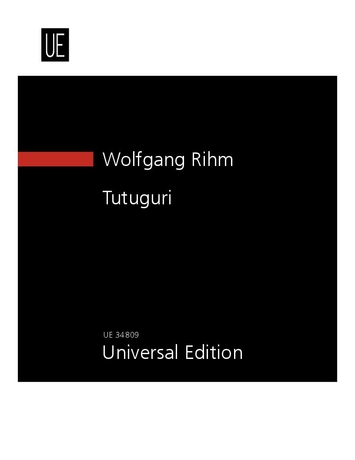

Wolfgang Rihm
Tutuguri
Short instrumentation: 3 3 3 3 - 4 3 3 1 - timp, perc(10), hp, pno, tape, str
Duration: 100'
Text von: Antonin Artaud
Instrumentation details:
1st flute (+picc)
2nd flute (+picc)
3rd flute (+picc)
1st oboe (+c.a)
2nd oboe
3rd oboe (+c.a)
1st clarinet in Bb
2nd clarinet in Bb (+bass cl(Bb))
3rd clarinet in Bb (+bass cl(Bb))
1st bassoon
2nd bassoon (+cbsn)
3rd bassoon (+cbsn)
1st horn in F
2nd horn in F
3rd horn in F
4th horn in F
1st trumpet in C
2nd trumpet in C
3rd trumpet in C
1st trombone
2nd trombone
3rd trombone
tuba
timpani
1st percussion
2nd percussion
3rd percussion
4th percussion
5th percussion
6th percussion
7th percussion (4 players in the auditorium)
harp
piano
violin I
violin II
viola
violoncello
contrabass
mixed choir from tape
Rihm - Tutuguri for large orchestra, choir on tape and speaker
Translation, reprints and more

Wolfgang Rihm
Rihm: Tutuguri – Poème dansé for large orchestra, choir on tape and speakerOrchestration: for large orchestra, choir on tape and speaker
Type: Studienpartitur
Audio preview
Work introduction
On reading the Artaud text for the first time: music flow, musical plunge
Like around a magnet: accumulation of music. Soon, not only the poem as starting point, more the conception of Artaudian theatre.
First imagination of a choreographic realisation only with this music and Artaud’s theatrical vision, therefore away from subject-plot theatre (individually related characters) toward a ritual theatre which is itself the subject (shaken collectives).
Consequence for the music: it can no longer be a linking figuration, arrangement of historical or less historical models: rather, it must – an old wish (of mine) – approach us in its raw state, as itself, naked, as the state of music. It must become a summons.
Of course, behind the idea of the music flow there is the wish for a freed, free music, in the thrall of its own compulsions only, “venereal drive” of its sounds, unbridled and bridled according to the dictates of fantasy. Basically: the desire for total freedom, no legalism, no entelechy. But this is becoming ever sharper, tenser, intolerant and volatile: because music notation is punctilious.
The music to Tutuguri is gradually becoming naked. All energies are otherwise are poled to context in the music – Arnaud’s text evokes no context, it presents the antithesis: detonation. Music acquiesces constantly: it is all the more difficult to break out of the contexts in order to reach what is compulsory without context. The absence of correlation of the parts in the irreversible wake of time.
Idea of a dark and strident cult.
The free and wild callings of the first part are answered by pure dinning: the impact as the beginning of music and its end … (free and wild are no longer categories at all).
Search for knee-jerk music, for a body of sound, its spasm and convulsion becoming melos, rhythm and colour (no dualism, insurgency against Yes-No compulsion).
Towards the end: obliteration of the colour, revocation of all obligation of development except the internal musical.
Musically, that means the path from style to the sound, the tone-that-was. The hope of flowing into what has never been heard.
The unacknowledged anxiety of destruction at any moment penetrates inexorably into consciousness; without intention, the attempt could arrive at atavism before the present – where the premundane is apparently endemic.
Wolfgang Rihm
